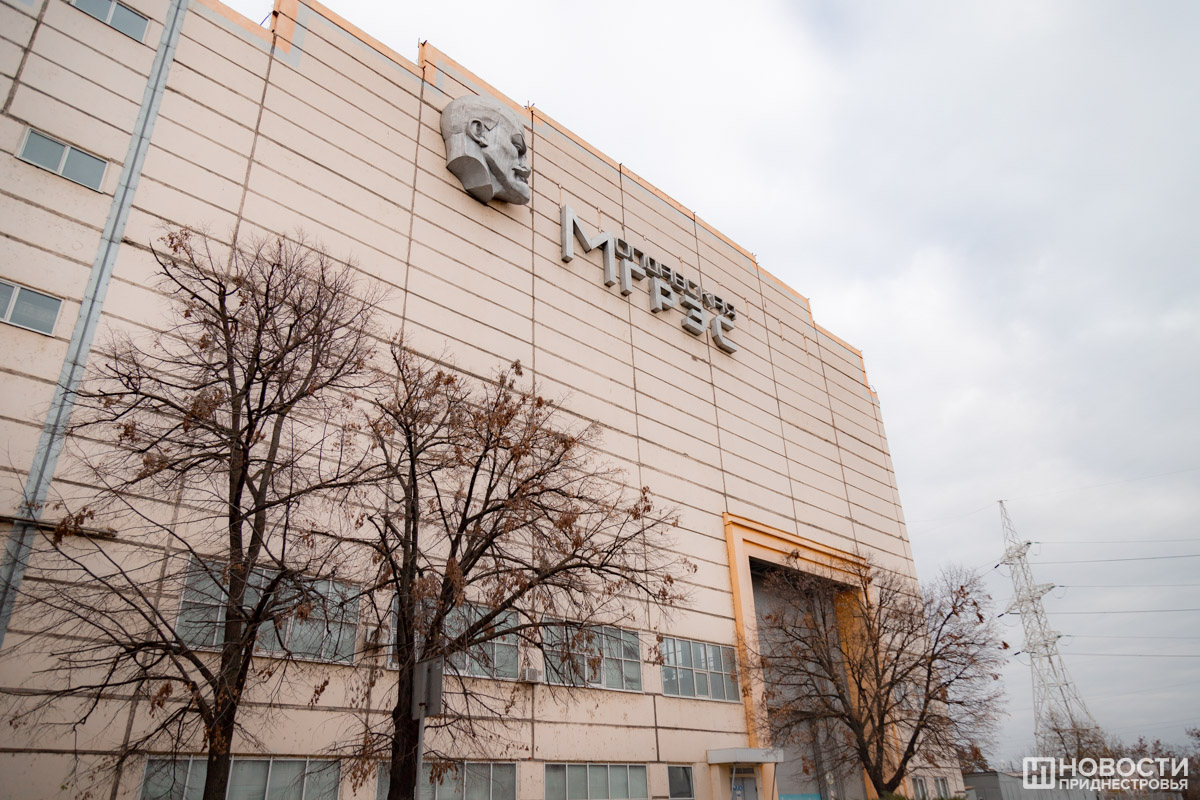Tiraspol, December 5. /Novosti Pridnestrovya/. The gas compromise and the resumption of supplies of Pridnestrovian electricity to the Moldovan market - all this was, without a doubt, the main news of the past weekend for both Pridnestrovie and Moldova. Moldavskaya GRES returns to normal operation. As noted at today's meeting with the President of Pridnestrovie Vadim Krasnoselsky, a total of 3 power units will be launched. Such loading will ensure sufficient stability of the energy system and prevent a repetition of the November blackouts.
The cost of electricity according to the contract, which was signed on December 3 between the Dnestrovskaya GRES and the Moldovan enterprise Energocom, will be $73 per megawatt-hour. This is 17% more expensive than it was in October but significantly lower than the level of prices for Romanian and European electricity, which Moldova purchased in November. Prices there, as you know, reached 180 euros, and at peak times of the pan-European shortage of electricity - even 450 euros.
The export of electricity to the Republic of Moldova is being resumed because, in parallel with the signing of the energy contract, the issue of natural gas supplies to Pridnestrovie was resolved. In December, the PMR will receive the entire volume of blue fuel, which today comes to our region from Gazprom - daily 5.7 million cubic meters.
This will allow not only for exporting electricity but also for restoring the round-the-clock hot water supply in the republic, returning street lighting, and a normal schedule for trolleybuses. It will be warmer in schools and residential buildings. Gradually, large energy-intensive enterprises will also begin to return to work - the Moldavian Metallurgical Plant and the Rybnitsa Cement Plant.
All this was preceded by very difficult, apparently, negotiations with Chisinau and a month of uncertainty, when Moldova took gas from Pridnestrovie.
Treachery Turned Against Chisinau Itself
It can be stated that that year the gas crisis for the PMR turned out to be much more acute than in the past when an uncertain situation arose with the signing of a new contract between JSC Moldovagaz and PJSC Gazprom for some time.
In October of this year, reduced volumes of gas began to flow to Moldova and Pridnestrovie - the same 5.7 million cubic meters. The Russian supplier explained this by the fact that NJSC Naftogaz of Ukraine refuses to provide a gas transportation service in full. However, the real reason, most likely, was different: JSC Moldovagaz at that time allowed violations of the payment schedule for the blue fuel received and did not audit the historical debt of the Republic of Moldova for gas within the agreed time frame. And on November 25, at a meeting of political representatives of the PMR and the Republic of Moldova, the Moldovan side admitted that this could be the case.
On October 21, a state of emergency was introduced in Pridnestrovie due to a shortage of gas and the start of the heating season was postponed. There were fears that in November the situation would worsen even more, but the republic still firmly counted on at least those 3.9 million cubic meters of blue fuel, which are guaranteed in the Moldovan-Russian gas contract for the PMR. However, here Pridnestrovie, as you know, had to face the treachery of Chisinau. In November JSC Moldovagaz reduced the amount of gas for the PMR by 40% to 2.3 million cubic meters.
At the same time, Pridnestrovie from the very beginning paid attention to the fact that the gas taken off (according to the results of November - a total of almost 50 million cubic meters), or at least part of it, could settle on the territory of Ukraine. On November 22, this was confirmed by Gazprom, and then, in fact, by NJSC Naftogaz, which stated that part of the blue fuel intended for Moldova and Pridnestrovie remains in Ukraine through a virtual reverse, which is carried out by the Moldovan authorities.
However, the treachery eventually turned against Chisinau itself. The withdrawal of gas from Pridnestrovie led to the fact that in November a contract was not signed for the supply of electricity from MGRES to Moldova. The Moldovan Government hoped that they would be able to replace the required volumes with supplies from Romania and the EU. This was done, but the whole thing turned out to be the price.
In the last month alone, the electricity tariff for the population in the Republic of Moldova has increased twice, and there were well-founded assumptions that it could rise to 8-10 lei (6.4-8 Pridnestrovian rubles) per kilowatt-hour. It was clear that consumers in Moldova would not withstand such tariffs for a long time.
In addition, November clearly showed that in the conditions of hostilities in Ukraine, Romanian electricity suppliers cannot guarantee stability. As a result, Moldova, like Pridnestrovie, experienced two blackouts last month. Today, the third one could have happened if the energy contract had not been signed over the weekend and the generation had not been fully launched at the Moldavskaya GRES.
A state of Emergency in the Economy Remains
Can we say that the gas crisis in the Moldovan-Pridnestrovian region has been resolved, and the preconditions for a new similar crisis have been eliminated? Probably not. This is largely why the state of emergency in Pridnestrovie has not yet been lifted.
We can say that today only an intermediate solution has been found for the gas scheme and the supply of electricity to the Republic of Moldova for December. It will likely be extended to the first quarter of 2023. As far as we understand, this is yet to be further agreed upon.
However, there remains a set of problems related to the relationship between Moldovagaz and Gazprom, and these unresolved problems affect the supply of blue fuel to our region in one way or another. We are talking about the same sagging audit of Moldova's historical debt to Gazprom (different figures are given here - from 600 to 800 million dollars), as well as a deal, as a result of which the Moldovan gas transportation system owned by Moldovagaz (and therefore Gazprom, which has a 50% stake in JSC Moldovagaz) was pledged to Energocom without the Board of Shareholders` decision. All these questions will still come up in the spring of 2023.
But for now, yes, we can all breathe a sigh of relief. Although Pridnestrovie will still need to save gas in winter: minus the amount that will be used to generate electricity sent for export, the republic is left with about 100 million cubic meters per month, and this will only be enough back to back.
Vladimir Dmitriev








